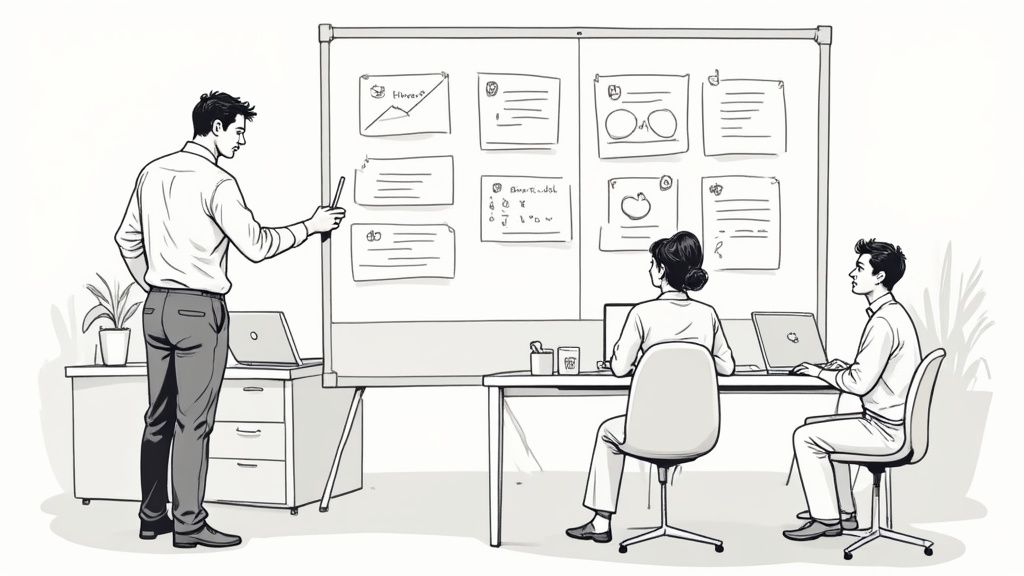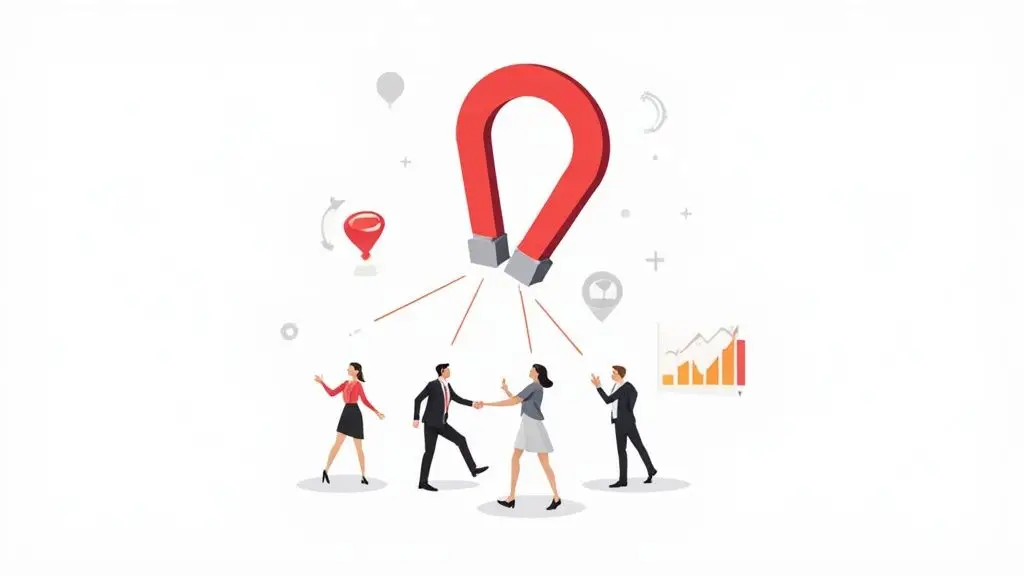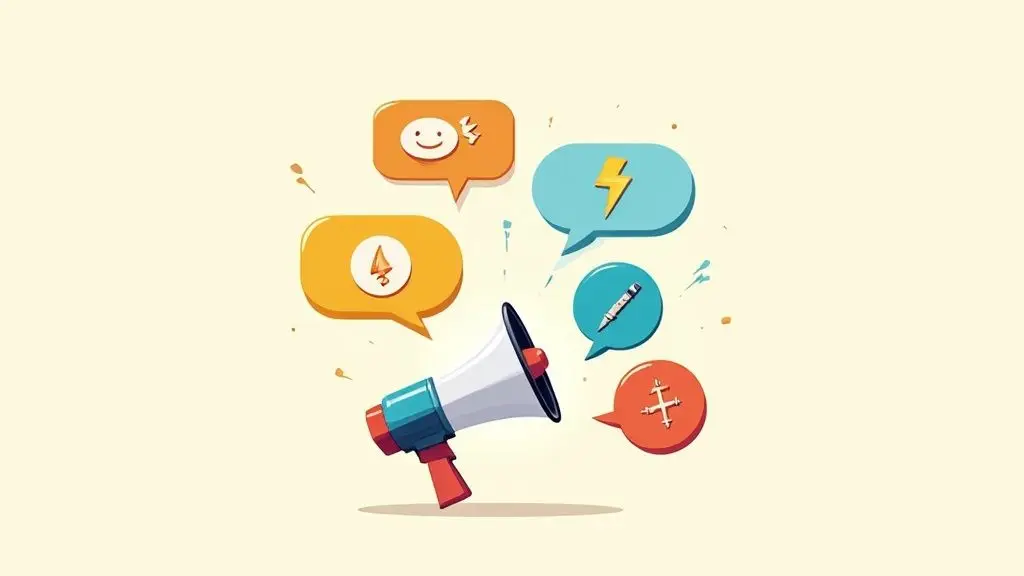The Entrepreneur's Balance Paradox: Beyond 9-to-5 Thinking

The traditional 9-to-5 workday rarely exists for entrepreneurs. It's not just about longer hours; it's a different relationship with their work. For many, their business is an extension of themselves, blurring the lines between professional and personal life. This creates a unique challenge in achieving work-life balance, making conventional advice often unhelpful and leaving entrepreneurs feeling frustrated.
The Psychological Ownership Effect
One key factor is the psychological ownership effect. Entrepreneurs feel deep ownership and responsibility for their businesses. This fuels passion and dedication, but also keeps them mentally tethered to their work, even during personal time. This constant mental engagement can lead to burnout and impact well-being.
Imagine an entrepreneur at a family dinner. Physically present, their mind might be racing with business concerns. This mental preoccupation hinders their ability to be truly present, impacting their work-life balance.
The Myth of Conventional Boundaries
Traditional advice focuses on setting boundaries between work and personal time. While helpful for traditional employees, this is often unrealistic for entrepreneurs. The unpredictable demands of entrepreneurship make rigid boundaries difficult. The very passion that drives them also makes disconnection a challenge. This doesn't mean boundaries are impossible; it means they need a different approach.
This paradox is reflected in statistics. While 60% of global workers report excellent work-life balance, 50% of entrepreneurs agree that business demands lead to burnout, with 46% experiencing it frequently. This stems from the blending of roles: 40% report stress from business spilling into personal lives, and 48% find stress management difficult. Find more detailed statistics here. The entrepreneurial journey, while rewarding, requires a nuanced approach to well-being. It demands recognizing the unique challenges and developing strategies tailored to the entrepreneurial lifestyle.
Counting the Real Costs of Entrepreneurial Burnout

Burnout isn't just a feeling; it's a threat to your business. It silently undermines your venture, making work-life balance essential, not optional. Ignoring this crucial aspect of entrepreneurship is a recipe for disaster.
The Impact on Decision-Making
One of the first things to suffer is your decision-making. Chronic stress clouds our judgment, hindering strategic thinking. We react impulsively instead of planning proactively, often leading to regrettable choices. Imagine rushing into a bad partnership or missing a key market shift – these are the costly mistakes burnout can cause.
The Erosion of Team Dynamics
Team management also suffers greatly. A stressed leader struggles to communicate effectively, motivate, and support their team. This creates a domino effect: decreased productivity, increased conflict, and high employee turnover. Worse, your team might adopt your stressed behavior, cultivating a culture of burnout that sabotages long-term success.
Stifling Innovation and Creativity
Burnout also stifles innovation. Mental fatigue makes it difficult to generate fresh ideas and think outside the box. Entrepreneurs rely on their ability to innovate and adapt, but burnout crushes this essential skill. The result? Stagnation and an inability to compete effectively.
The mental toll of entrepreneurship is real: 38% of entrepreneurs frequently experience stress juggling work and life. Self-efficacy, the belief in one's ability to succeed, is a powerful buffer. Yet, only 38% feel confident balancing both. Interestingly, those with high self-efficacy (46%) manage stress better through structured schedules and delegation.
This aligns with research showing that prioritizing self-care and family creates a positive feedback loop, benefiting well-being and business performance. However, the entrepreneurial mindset often pushes us to prioritize work, despite the flexibility it offers. This explains why burnout persists, even among successful entrepreneurs. Explore this further here. Clearly, work-life balance isn’t just about personal well-being; it’s vital for your bottom line.
Beyond Balance: The Integration Revolution for Founders

Let go of the idea of "perfect balance" between work and life. For entrepreneurs, true harmony comes from integration, not separation. This means weaving all aspects of your life together into a unified whole, rather than constantly struggling with competing priorities. It acknowledges that your business is more than just a job; it's a fundamental part of you.
The Power of Flexibility
Entrepreneurs have a significant advantage: flexibility. They can use this to build a life that supports both ambitious business goals and personal fulfillment. Instead of rigidly separating work and personal time, they can strategically blend them. This might involve working from home to attend a child's school event, or taking a break for a midday workout. This fluidity creates a more sustainable and fulfilling lifestyle.
For instance, an entrepreneur could schedule focused work during their most productive hours and then integrate personal appointments or family time during less demanding periods. This adaptable strategy allows them to meet both professional and personal commitments without feeling torn.
The Mindset Shift: From Balance to Harmony
True integration requires a mindset shift. Instead of viewing work and personal life as opposing forces, see them as complementary parts of a whole. This reframes "balance" as the creation of a harmonious ecosystem where both can thrive. It’s about aligning your actions with your values and making conscious choices about how you spend your time and energy.
This involves identifying your non-negotiables: the activities essential to your well-being and success. These might include quality time with loved ones, regular exercise, pursuing a hobby, or simply quiet time for reflection. By prioritizing these, entrepreneurs create space for personal growth, which strengthens professional performance.
Global research on work-life balance reveals the specific challenges entrepreneurs face. Data shows mental health and work satisfaction are essential for success. While 30% of entrepreneurs in the service sector face client-driven work-life challenges and 46% report burnout affecting their balance, 38% maintain harmony through self-efficacy and clear boundaries. Explore this topic further. This emphasizes the need for strategic approaches beyond simply reducing work hours. More and more, entrepreneurs are prioritizing flexibility and control over their schedules to reduce stress while remaining productive. This proves that integration, not just balance, is the key to lasting success.
Building a Framework for Integration
Successful integration requires conscious effort and a supportive structure. This involves:
-
Setting Clear Boundaries: Even with a flexible schedule, boundaries are essential. Define clear start and end times for your workday whenever possible, and communicate these to clients and your team.
-
Leveraging Technology: Use productivity tools like Asana or Trello to manage time effectively and automate routine tasks. This frees up mental space for more focused work and personal time.
-
Prioritizing Self-Care: Self-care isn't an indulgence; it's essential. Regular exercise, healthy eating, and mindfulness practices maintain energy and manage stress.
Through integration, entrepreneurs can create a life that reflects their values and supports both their professional and personal ambitions. It's not about a mythical 50/50 split, but about intentionally designing a life that feels whole and fulfilling.
Designing Business Systems That Create Freedom

As an entrepreneur, successfully blending work and life requires more than just wishful thinking. It demands intentionally designing business systems that nurture your work-life balance, not sabotage it. This means strategically approaching delegation, automation, and team building to liberate yourself from constantly being the bottleneck.
Identifying Your Energy Drains and Gains
Creating a business that fosters freedom starts with understanding your own energy. Ask yourself: Which tasks leave you feeling drained and depleted? And conversely, which tasks energize and inspire you? This self-awareness is essential for effective restructuring. For instance, if client calls exhaust you, but creating content ignites your creativity, restructure your business to minimize the former and prioritize the latter.
Strategic Delegation: Reclaiming Your Time
Once you've pinpointed your energy drains, strategic delegation becomes vital. This isn't simply offloading tasks; it's about entrusting others with responsibilities that don't align with your strengths or energy levels. This could involve hiring a virtual assistant for administrative tasks, outsourcing social media management to a platform like Hootsuite, or bringing on a project manager to handle client communication. This frees you to focus on high-impact activities that propel your business and maintain your work-life balance.
Automating for Efficiency and Freedom
Automation is another cornerstone of a freedom-focused business. Automating repetitive tasks reclaims precious time and mental energy. This could include anything from using email marketing software like Mailchimp to schedule newsletters, to implementing project management tools like Asana or Trello that streamline workflows. This not only boosts efficiency, but also creates space for activities that contribute to a healthier work-life balance.
Building a Team That Supports Your Vision
As your business expands, team building becomes increasingly critical. A strong team not only distributes the workload but also leverages the unique talents of each member. This means hiring individuals who complement your abilities and embrace your vision for a sustainable work environment. This shared commitment to work-life balance strengthens its importance throughout the company.
Implementation Roadmaps for Different Stages
Implementation strategies will differ depending on your business's stage. Solopreneurs might focus on automating basic tasks and outsourcing specialized skills. Scaling teams, however, need more robust systems for delegation, communication, and project management.
The following table outlines a framework for strategic delegation:
Strategic Delegation Matrix for Entrepreneurs
A decision framework for identifying which tasks to keep, delegate, automate, or eliminate to reclaim your time without sacrificing results
| Task Category | Decision Criteria | Recommended Action | Implementation Difficulty | Time Benefit |
|---|---|---|---|---|
| Repetitive Administrative Tasks | Low strategic impact, high time consumption | Automate or Delegate | Easy to Moderate | High |
| Client Communication | Moderate strategic impact, moderate time consumption | Delegate or Systemize | Moderate | Moderate |
| Content Creation | High strategic impact, high energy gain | Keep | N/A | N/A |
| Financial Management | High strategic impact, potential energy drain | Delegate or Automate (partially) | Moderate to High | Moderate |
This matrix provides a starting point for analyzing your tasks and making informed decisions about delegation and automation. Remember to prioritize tasks that offer the highest time benefit and align with your overall business strategy.
Business Stage Focus
The approach to delegation and automation also varies depending on the business stage:
| Business Stage | Key Focus | Example |
|---|---|---|
| Solopreneur | Automation & Outsourcing | Scheduling social media, outsourcing bookkeeping |
| Growing Team (2-5 people) | Defining Roles & Delegating | Hiring a virtual assistant for administrative tasks, delegating client onboarding |
| Scaling Team (5+ people) | Systemizing Processes & Building Culture | Implementing project management software, establishing clear communication protocols, fostering a culture of work-life balance |
By designing your business around your energy and strategically implementing systems for delegation and automation, you create a business that genuinely supports your work-life balance. This empowers you to thrive both professionally and personally, achieving sustainable entrepreneurial success.
Mental Models for Sustainable Entrepreneurial Success
Your mindset: it can be your biggest obstacle or your greatest ally. As an entrepreneur striving for work-life balance, cultivating the right mental frameworks is paramount. This section explores the mental models that empower entrepreneurs to thrive, both personally and professionally. We'll uncover how successful founders reframe productivity, success, and time to support both business performance and personal fulfillment.
Redefining Productivity: Impact Over Hours
Many entrepreneurs fall into the trap of equating long hours with productivity. But true productivity isn't about how much you do, it's about the impact you create. This shift requires focusing on what you do and how effectively you do it. Strategically delegating tasks, for example, frees you to focus on high-impact activities that truly move the needle, fostering a healthier work-life balance.
Reframing Success: Holistic Well-Being
It's easy to get caught up in the pursuit of business metrics like revenue and market share. But sustainable entrepreneurial success must encompass holistic well-being. This means prioritizing your physical and mental health, relationships, and personal fulfillment as integral parts of your overall success. Just as a balanced diet nourishes your body, a balanced life nourishes your entrepreneurial spirit.
Time Allocation: Intentional Choices
Time: your most valuable asset as an entrepreneur. Treat it accordingly. Intentional time allocation involves making conscious choices about how you spend your time, aligning your schedule with your values and priorities. Think of your time like an investment portfolio – diversify your "investments" across business-building activities and personal pursuits that recharge and inspire you.
Overcoming Psychological Barriers
Entrepreneurs often face unique psychological challenges that hinder work-life balance. Perfectionism can lead to overwork and burnout. Control issues can make delegation difficult. And founder guilt can prevent entrepreneurs from taking breaks and prioritizing personal time. Recognizing and addressing these barriers is crucial for a healthier relationship with your business. Mindfulness and meditation, as highlighted in Katie Kastner's blog, can be powerful tools for navigating the demands of entrepreneurship.
Cognitive Tools for Holistic Decision-Making
Making decisions aligned with your holistic goals requires effective cognitive tools. The Eisenhower Matrix, for example, helps categorize tasks based on urgency and importance. Cost-benefit analysis involves weighing the potential benefits of a decision against its costs – not just financially, but also in terms of time, energy, and personal well-being. Incorporating these tools ensures your choices support both your business and personal life. As Gillian Perkins points out in her blog post on mindset shifts, believing work-life balance is achievable is a powerful first step.
By adopting these mental models and weaving them into your daily routine, you can create a sustainable entrepreneurial journey. This isn’t about working less; it’s about working smarter and living more intentionally – a journey that supports both your business ambitions and your overall well-being.
Battle-Tested Strategies From Balanced Entrepreneurs
Successfully balancing work and life as an entrepreneur isn't about magic. It's about implementing practical, effective strategies. Let's explore tactics used by entrepreneurs who've successfully integrated their professional and personal lives.
Calendar Management: Time Blocking and Prioritization
Effective time management is crucial. Many successful entrepreneurs rely on time blocking, allocating specific time slots for particular tasks or activities. This creates structure and minimizes distractions, promoting focused work and dedicated personal time. A simple example? Block mornings for deep work, reserving afternoons for meetings and client calls.
Prioritizing tasks is also essential. Use tools like the Eisenhower Matrix (urgent/important) to discern critical tasks from those that can be delegated, automated, or even eliminated. This focused approach prevents overwhelm and directs your energy where it truly counts.
Communication Protocols: Setting Clear Expectations
Open communication is paramount for healthy boundaries. Set clear expectations with clients, colleagues, and family. Define your working hours and stick to them. Consider using an auto-reply for emails outside work hours or a scheduling tool like Calendly to manage appointments. Communicating your boundaries ensures respect for your time.
Boundary-Setting Techniques: Protecting Your Personal Time
Protecting personal time involves more than just setting boundaries – it's about upholding them. Learn to decline requests that encroach on your non-negotiable personal time. While challenging at times, this is crucial for preventing burnout. Physical boundaries also help. Designate a dedicated workspace to separate work from your personal life, making it easier to disconnect when you're not in that space.
Energy Optimization: Fueling Your Productivity
Optimizing energy levels goes beyond just sleep. Observe your ultradian rhythms, your natural energy cycles. Schedule demanding tasks for peak productivity periods and lighter tasks for lulls. Incorporate regular breaks, exercise, and healthy eating habits to maintain sustained energy. Practices like mindfulness and meditation can manage stress and improve mental clarity.
Learning From Mistakes: The Path to Sustainable Balance
Achieving work-life balance isn't an overnight feat. It's a continuous process of learning and adaptation. Experiment with different strategies, observe what works, and adjust accordingly. Don’t hesitate to seek guidance from mentors or coaches. Building a supportive network of fellow entrepreneurs provides a space to share challenges and learn from each other.
Real-world examples show the power of these adjustments. Entrepreneur and mother Katie Kastner shares her experience with mindfulness and dedicated workspaces on her blog about work-life balance for entrepreneur moms.
The following table offers tailored strategies for various business stages:
To better understand how these strategies can be applied at different points in your entrepreneurial journey, let’s explore a breakdown of work-life balance approaches based on business stage:
Work-Life Balance Strategies by Business Stage
| Business Stage | Primary Challenges | Recommended Strategies | Key Metrics to Monitor | Common Pitfalls |
|---|---|---|---|---|
| Startup | Long hours, juggling multiple roles | Time blocking, prioritizing essential tasks, outsourcing non-core functions | Hours worked, revenue generated, customer acquisition cost | Neglecting personal time, micromanaging |
| Growth | Scaling operations, managing a team | Delegating effectively, establishing clear processes and communication protocols | Team productivity, customer satisfaction, employee retention | Burnout from overwork, losing sight of initial vision |
| Maturity | Maintaining momentum, avoiding stagnation | Focusing on strategic initiatives, empowering team members, prioritizing personal growth | Profitability, market share, employee engagement | Complacency, neglecting innovation |
This table illustrates how different challenges require specific approaches to maintaining a healthy work-life balance as your business grows.
Are you ready to build a business that supports your life, not consumes it? Henri Den offers coaching and resources designed specifically for solopreneurs, creators, and career shifters seeking clarity, purpose, and fulfilling work-life integration. Discover how to build a thriving business and a life you love.






